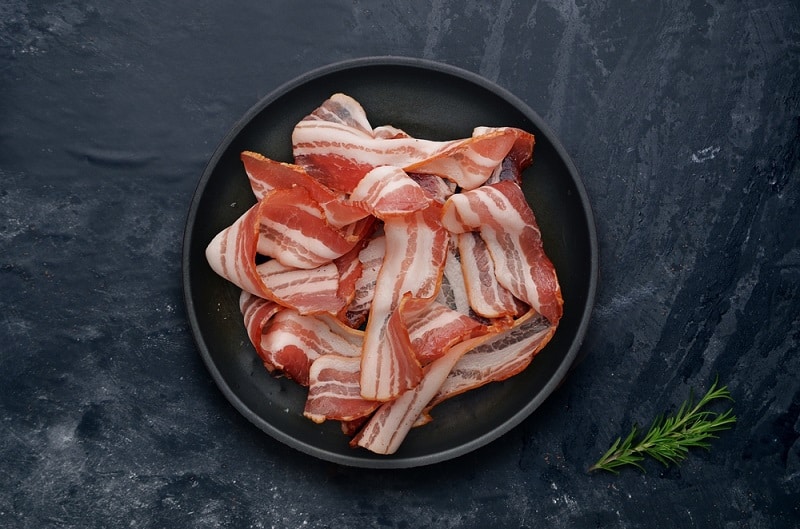Staying away from bacon for breakfast, lunch, or dinner is sometimes challenging. You don’t need to worry, because bacon is a good option as a snack, topping, or a full meal, if consumed with responsibility.
Bacon is popular worldwide. Furthermore, an American eats around 17 lbs of bacon annually. According to the National Pork Board, more than half of America’s total households have bacon in their kitchens. [1][2]
Having bacon in daily meals is somehow natural. With that, the next question rises – can bacon go bad? Well, if it is not stored accordingly, the famous piece of meat can actually become a threat to your health.
Luckily, I have prepared a full list of information about how to store, consume, and check bacon’s availability like a pro. So let’s start!
The Average Shelf Life of Bacon

While fresh bacon is bliss, bacon can lead to gastrointestinal illness once this meat is improperly stored.
Knowing if the bacon piece you will be eating is fresh and of good quality is essential for your health. The factors that will determine how long the meat is good for consuming are:
- Is it pre-cooked or not?
- How is the bacon stored?
- What type of bacon do you have?
Usually, an unopened vacuumed bacon will stay fresh for up to 2 weeks if you leave it in the refrigerator. Once you store it in the freezer, it can be consumed for up to 8 months.
Meanwhile, supposedly you have already opened and cooked the bacon. In that case, you can store it properly for somewhere around 4-5 days in the refrigerator and up to 1 month in the freezer.
If you bought vacuum-sealed raw bacon, as long as you will not open the package, the meat would stay fresh until the “best to consume until date,” sometimes even longer. But my advice is not to go beyond that term.
If you choose to reuse the bacon grease after cooking, make sure you don’t refrigerate it for more than 6 months or up to 9 months in the freezer. If you don’t store it accordingly, grease will go rancid.
Now, as you might already know, there are more types of bacon but mostly have similar shelf life as follows:
- Cooked Canadian bacon can be reused if refrigerated for 3-4 days or frozen for 4-8 weeks;
- Turkey Bacon, Pancetta, or Beef Bacon have the same average shelf life as the Canadian one. This means it will last for the same amount of time in the fridge or freezer.
In a nutshell
Once storing the bacon properly, by using a source of cold air, such as the freezer or the fridge, you will be able to prolong bacon’s shelf life. Don’t forget to consider the type of bacon you have if cooked or raw.
Personal Tip
If you want a more extended storage period, make sure you will wrap the bacon package right before freezing. This way, you will avoid any possible freezer burn and extend the freshness of your meat for 2 months longer. Use plastic raps or freezer bags as well.
Learn To Store Bacon Properly

There is no doubt our daily ingredients taste better and make our taste buds happier if fresh. Furthermore, there is no doubt that most of the time, the main helper in this direction is the fridge.
Bacon needs fridge storage, unless, of course, it is kept in the freezer. The refrigerator is the best place to store every kind of bacon you are buying. This is regardless if it is pre-cooked meat, raw or unopened, slices of bacon, or the leftovers from the night before.
However, it is essential to know how to store bacon depending if it is thermally processed or not. Here are some tips to keep in mind:
Storing Uncooked Bacon
- The very first thing to do is examine the piece of meat visually right before buying. Don’t forget to keep an eye on the sell-by date, so you know when is the last date on which the piece of meat can be consumed.
- Before storing the bacon piece, you should wrap it in paper towels. Paper has the property of absorbing all the meat’s moisture and can prevent it from producing respiration.
- Whether it is a big piece or slices of meat, always keep the bacon in the freezer. Unopened bacon can stay fresh in the refrigerator for more than two weeks if the expiration date allows it. If you freeze it, this period can go up to eight months.
- To prolong the shelf life of uncooked, opened bacon, I suggest using a resealable plastic bag or wrap the meat perfectly using aluminum foil. Using plastic wrap is also a wise idea.
- Check the piece of bacon regularly. This way, you can notice any possible degradation.
Storing Cooked Bacon
- Usually, the cooked bacon that stays in the refrigerator can last for almost a week or so. If you use bacon once in a while, then choose to store it in the freezer, as it will stay fresh for two months at least.
- Even if it is already cooked, it is easy to make sure the bacon will stay fresh. Use shallow tight containers or aluminum/plastic wraps for storing cooked bacon.
Storage Tips
I always make sure the bacon is wrapped correctly, especially if the meat was previously cooked or the package opened.
Also, once you need to store cooked bacon, it is essential to let it cool before transferring it into the fridge. Take your time, as this cooking process might last one hour, but it is a crucial step. Otherwise, the meat will spoil.
I have learned to take the best from bacon, even its grease. I recommend you let the grease get cold, then wrap it in a plastic bag and only after that transfer it into the fridge or the freezer. Use this grease to add more flavor to your daily meals.
Personal opinion: I, for once, use stored bacon fat for my bean stews. It goes very well for the taste of beans and fresh herbs.
How To Tell The Bacon Goes Bad
With the risk of repeating myself, I will say that bacon has a sell-by date label, just like all the other meat products we find on the market. Checking the expiration date should be in our instinct when going shopping.
Now, you might not know this, but there is a difference between the sell-by date and expiration date. This means that you may still be able to consume bacon even after the first-mentioned date.
Nevertheless, how do you know the meat is still suitable for consumption? How can you be 100% sure that the bacon did not get spoiled already?
Keep on reading to find some tips and tricks to know if the bacon has gone bad or not:
1. Expiry Date
Redundantly or not, the first thing to do is to check the expiry date on the bacon packet. Most of the stores and food processors choose to date offered by the producers. If the “use by” date is already expired, then you should definitely not consume that piece of bacon. [3]
Try to eat the piece of bacon in the first week after purchase.
Tip!
Try to differentiate “sell by” and “use by” recommendations. The first one is only the store’s recommendation, while the “use by” is listed by the manufacturer. The “sell by” only advises you to consume the bacon sooner, until the meat is still safe to eat.
2. Bacon’s Aspect
Some might say bacon always looks good. Well, take a better look at the piece of meat. The last thing you want is to have a bad meat experience, leading to gastrointestinal illness.
The first thing to do is to go to a room with a good natural light source, where you can observe the meat properly. The bacon piece is safe to consume if it has a natural pink color. [4]
Bacon is surely pink meat, with parts of white fat. Sometimes, fat can look a bit yellowish. If you notice possible green dots over the meat or see that the bacon is a bit dull or fleshy, you should not consume it. That piece of bacon might be already spoiled.
Good to Know!
One of the reasons why meat gets spoiled is because of too much exposure to air. The chemical reactions affect the natural, fresh color of meat.
3. Smell
Fresh bacon should always have a meaty, natural flavor and smell. If the bacon you have starts to smell rotting, unpleasant, fishy, or a bit sour, this is the main sign of possible bacteria growth.
4. Touch
Good, fresh bacon should be soft, moist, and elastic. Bad bacon will simply get sticky. This happens due to the lactic acid bacteria that causes a slime coat over the meat. [5]
In case you observe this, wrap up the bacon immediately and throw it out, far away from the other ailments.
Be Aware!
Any spoiled bacon that does not feel or smell good can contain large amounts of bacteria, such as Salmonella, Escherichia coli, or Bacillus. Consuming rotten meat can cause food poisoning. [6]
If it’s not good for you, it is not good for your furry animal either. Never feed pets with spoiled meat. They will be harmed by these bacteria as much as you would.
Furthermore, wash your hand perfectly after you have thrown the spoiled bacon.
How To Shop For Bacon

Here are some tips to always shop for fresh, good quality meat products:
- Select your bacon, and then go straight home to refrigerate the meat properly. Otherwise, your meat will warm up and conduct to bacteria growth. Always store the bacon at 40ºF/4.4ºC or lower.
- Make use of a special cold storage bag if you have one. Bacon deserves a cold journey to your home.
- Look for bacon that has few ingredients. There should not be more than four. Go for a piece of meat that has ingredients you can least pronounce, such as water, pork, salt, and sugar. The extras most likely are only chemicals and preservatives. [7]
- Don’t trust the “no nitrates” ticker. That might only mean there is no sodium nitrate in that piece of meat. However, there can be other harmful chemicals instead.
- The best bacon is from a trustful, local source, with few preservatives and from pigs raised in human conditions.
Bottom Line
As you have learned by now, bacon is always a great option to add a tasty, almost umami, flavor to your meals, especially if you cook it.
However, it is crucial to check if the piece of meat is fresh. Consider extending the shelf life by freezing the bacon, and always remember to wrap it properly.
